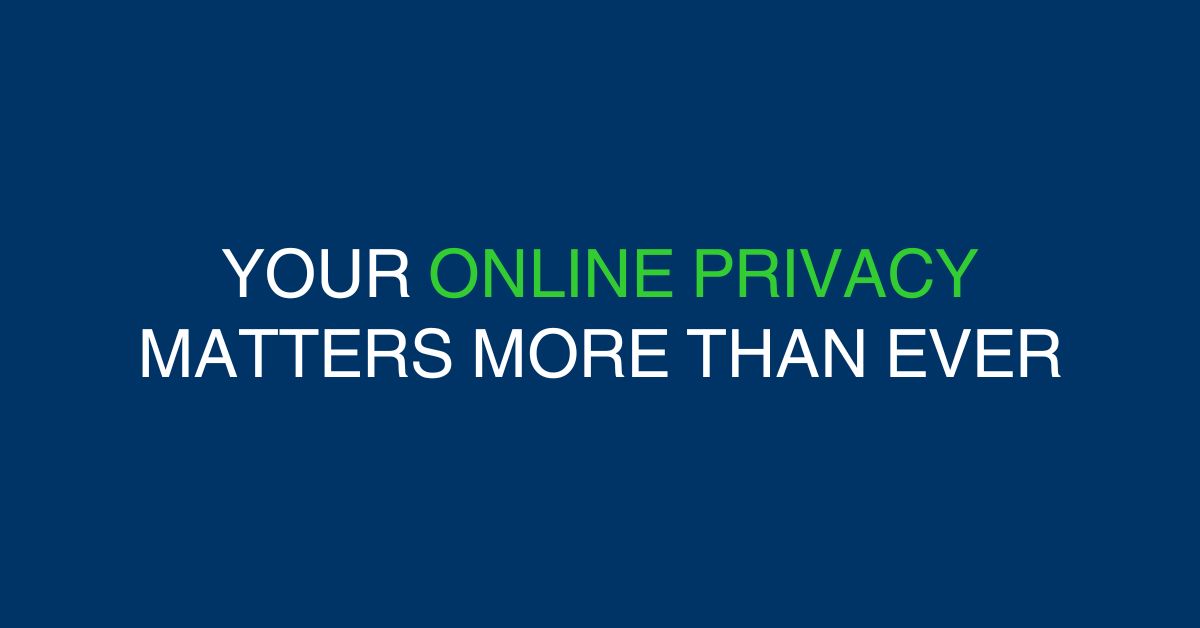Have you ever noticed ads for items you’ve just searched for popping up on different websites you visit? This isn’t a coincidence; it’s a result of online tracking and profiling, a practice that might seem harmless but can actually have profound implications for your personal and business privacy.
Online privacy, simply put, is the right and ability to control what personal information you share on the internet and who has access to it. It’s crucial not just for maintaining your autonomy but also for protecting yourself against increasingly sophisticated scams and identity theft.
For individuals, securing online privacy means keeping sensitive information like your financial details, personal communications, and browsing habits private and protected from various third parties (including cyber criminals). For businesses, it’s about safeguarding proprietary information and maintaining the trust of customers who expect their data to be handled responsibly.
The benefits of robust online privacy management are twofold. Firstly, it helps prevent financial fraud and identity theft, which are rampant in our digital world. Secondly, it empowers you to control the narrative of your personal and professional reputation online. With the rising prevalence of data breaches, no one can afford to overlook the importance of internet privacy.
Main Threats to Online Privacy
Staying safe in the digital world requires an understanding of the main types of threats to privacy while being online. Each threat has distinct characteristics and implications, making it crucial for both individuals and businesses to be aware of them. Here’s an in-depth look at the primary threats to your private information.
Data Collection & Tracking
Virtually every interaction you have online involves some form of data collection. Websites and apps gather information such as your browsing history, location, IP address, device identifiers, and even keystroke dynamics. This data collection supports functionalities like personalizing your browsing experience or improving app usability. However, the darker side emerges when this data is used for targeted advertising, creating detailed user profiles, or sold to third parties without explicit consent.
More intrusive practices include the use of third-party tracking cookies, pixel tags, and fingerprinting technology. These techniques can track your activities across multiple sites, creating a comprehensive profile of your online behavior, preferences, and even financial habits. Such extensive data collection raises significant privacy concerns, especially when the data falls into the hands of malicious actors or is mishandled.
Cybersecurity Threats
Cybersecurity issues affecting online security:
- Phishing attacks and Scams: These involve deceptive emails and messages designed to appear as if they are from legitimate sources. The goal is to trick you into divulging sensitive information such as passwords, banking details, or social security numbers.
- Malware: This includes viruses, spyware, and ransomware that can infiltrate your devices to steal data, monitor your actions without consent, or lock you out of your data, demanding ransom.
- Data breaches: These occur when hackers gain unauthorized access to a company’s database, potentially exposing the personal and financial information of millions of users. A data breach not only leads to direct loss of privacy but also places individuals at risk of identity theft and financial fraud.
Social Media Privacy Issues
While social media platforms are a modern way to connect with others, they also pose significant data privacy risks:
- Oversharing: Posting too much personal information can expose you to identity theft and digital stalking. Sharenting is a type of oversharing that involves parents sharing too much information regarding their children, exposing them to cyber or even physical threats.
- Data mining: Social media companies collect vast amounts of data to drive their advertising platforms. This can include tracking both your on-site and off-site activities. Many privacy protection regulations were set in place by governments to protect users against Social Media Platforms abusing their data.
- Social engineering attacks: These are sophisticated tactics that manipulate users into sharing personal information or downloading malicious software based on data gathered from their social media activity. Social engineering is typically a stepping stone for a more sophisticated attack.
Additional Concerns for Business Owners
Businesses face unique online privacy challenges that can impact their operational security and consumer trust:
- Employee monitoring: While businesses may monitor employee activity to protect against internal threats, this practice must balance with respect for employee privacy.
- Customer data management: Businesses collect sensitive customer data daily. Ensuring this data is handled securely and in compliance with privacy laws (like GDPR or CCPA) is crucial.
- Insider threats: These can occur when employees misuse access to sensitive information or when former employees retain access to systems post-employment.
Protecting Your Online Privacy
Keeping track of your private information online requires some discipline. But as digital threats evolve, so should our strategies for protecting our online activity against curious eyes. Both individuals and businesses can take proactive steps to safeguard their data from the vulnerabilities discussed previously. Implementing the following measures can significantly enhance your online security and digital privacy.
Securing Your Devices
- Use of Antivirus Software: Always keep your antivirus software updated to protect against malware infections that can compromise your privacy. Many endpoint security also offer specialized protection against data collection and online surveillance.
- Strong Passwords and Authentication: Use complex passwords and consider tools like password managers to maintain their integrity. Enabling two-factor or multi-factor authentication adds an additional layer of security.
- Regular Software Updates: Keeping your operating system, browsers, and all applications up-to-date ensures that security patches protect your data from new vulnerabilities.
Taking Control of Your Data
- Adjust Browser Settings: Minimize data collection by adjusting your browser’s privacy settings to block third-party cookies and limit site permissions.
- Privacy-Focused Tools: Use privacy-focused browsers and search engines that do not track your activities. Tools like VPN (virtual private network) can encrypt your internet connection, hiding your data from prying eyes, especially on public Wi-Fi networks. Digital Identity Protection solutions are also useful for keeping track of your personal information in the digital world.
- Review and Modify App Permissions: Regularly review the permissions granted to applications and the security settings on your devices, limiting access to essential functionalities only.
Understanding Your Rights
- Data Protection Regulations: Familiarize yourself with regulations like GDPR (General Data Protection Regulation) in Europe, CCPA (California Consumer Privacy Act), or other local laws that protect your rights to data privacy. These regulations often give you the right to request data deletion, access the data companies hold about you, and obtain information about its use and distribution.
- Read the Privacy Statement: This is unpopular as the language of the Terms and Conditions is not the friendliest. Still, having a look and understanding what will be your data used for is important for your privacy online.
- Opt-Out of Data Sharing: Take advantage of opt-out opportunities from data brokers and marketing lists to reduce the volume of personal information that’s commercially available.
Safe Browsing Habits
- Secure Connections: Avoid conducting financial transactions or sending sensitive information over public Wi-Fi. Using a VPN can secure your internet connection anywhere you work or browse.
- Phishing and Scam Protection: Learn to recognize phishing attempts. Be cautious about clicking on links in unsolicited emails or messages. Verify the authenticity of the request through direct contact methods.
- Information Sharing: Be mindful of the personal information you share on social media and other online platforms. Adjust privacy settings to control who can see your posts and personal information.
For Business Owners
Businesses need to enforce robust data security practices to protect not only their operational data but also the information of their customers:
- Employee Training: Regular training sessions can help employees recognize and respond to cybersecurity threats like phishing and social engineering attacks.
- Data Encryption: Make sure the sensitive data is encrypted while stored on devices or while transiting the Internet to prevent unauthorized access.
- Access Controls: Implement strict access controls and use the principle of least privilege to ensure employees can only access the data necessary for their roles.
Conclusion: Empowering Action for Online Privacy
Whether you are an individual doing social networking, a parent looking for your children, or a business striving to maintain customer trust and regulatory compliance, the significance of online privacy cannot be overstated. Throughout this article, we’ve explored a range of threats to online privacy and outlined practical measures to protect against these vulnerabilities.
Key Points
- Data collection and tracking are pervasive in the digital ecosystem, necessitating vigilant management of your digital footprint.
- Cybersecurity threats such as phishing, malware, and data breaches pose significant risks, underscoring the need for robust security practices.
- Social media platforms, while central to modern communication, require careful consideration of privacy settings to mitigate the risk of personal data exploitation.
- Business owners face additional challenges, including the need to protect sensitive customer information and manage internal data security risks effectively.
What To Do
Take steps today to enhance your online privacy:
- Review and adjust your device and browser settings.
- Educate yourself about phishing and common scams.
- Consider adopting tools like VPNs, privacy-focused browsers, and Digital Identity Protection suits.
- For business owners, invest in employee training and robust data protection measures.
By taking control of your online privacy, you not only protect your personal and business data but also contribute to a broader cultural shift towards greater respect and consideration for privacy in our digital world. Make online privacy a priority!




